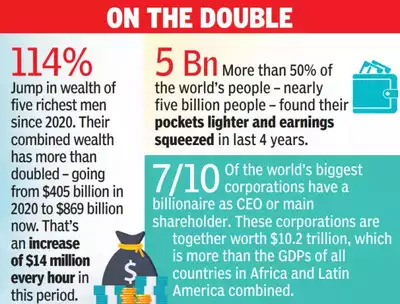It painted a stark picture of inequality both inside and between nations and highlighted how it is growing, with grave ramifications for all facets of life. There have always been glaring disparities in the globe, and the Covid epidemic has made them worse. In contrast to the poorest 60% of the world’s population—nearly five billion people—the richest five men have seen their fortunes more than double since 2020.
In roughly ten years, the world will witness its first trillionaire, but at the current rate of alleviation, poverty would take 229 years to end. According to the research, inequality has caused at least one death every four seconds and left 99 percent of people in poorer shape than before the pandemic. All forms of inequality, including those that are racial, gendered, economic, and national, have gotten worse.

Source: Times of India
Although inequality has long been acknowledged as a reality, its effects have not always been completely appreciated. Essentially, it leads to deaths from starvation and hardship, as well as from gender-based violence and unequal access to healthcare and education. The wealthy provide the majority of the greenhouse gas emissions that fuel climate change, yet the poor bear the brunt of its effects.
Even while inequality exists everywhere and is being discussed as a way to reduce it, not much is being done to solve it. This is mostly due to the fact that wealthy people create and carry out the policies and programs meant to combat poverty, and they frequently utilise the same resources, ideas, and policies to further enrich themselves. Inequalities within the political, social, and economic spheres are detrimental to the marginalised and vulnerable.
Deeply unequal social divisions have long exacerbated economic and other forms of inequality in Indian society. The budget for healthcare actually decreased by 10% during the Covid period, while the budget for education witnessed a 6% decrease. The nation’s unemployment rate and poverty rates rose as the wealthiest got wealthy. India is home to half of the world’s impoverished, but it also boasts the third-highest concentration of billionaires worldwide.
Source: Global News
Despite the nation’s federal structure, the report also pointed out that the revenue resources continued to be concentrated in the hands of the central government. It has made several recommendations about how to address inequality. One of them is taxing the wealthiest people’s gains from the COVID-19 pandemic and putting the money raised toward ending poverty and saving lives.
It has also advocated for the modification of laws and regulations, particularly those that discriminate against women, in order to give the impoverished more clout in the economy and society. While many of the recommendations are not novel, they must be reiterated often.
What do you think about this? Comment below.

